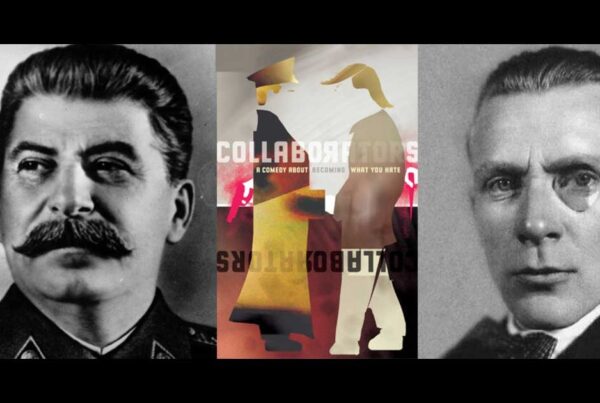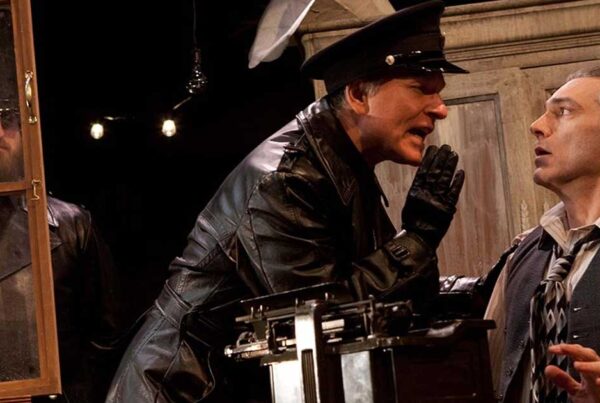
Pittsburgh Post-Gazette – Something old and something new: Quantum Theatre’s shows are rarely conventional or predictable, but Lope de Vega’s “Peribanez” plays with conventions in surprising ways, while its ending is bound to catch you by surprise.
Is it a comedy or something darker? Yes, both. To start, it’s almost commedia dell’arte — call it proto-Marx brothers — and simultaneously romantic in a lush, earth-earthy way. You could swoon over the visual-tactile descriptions. Gradually that love-among-the-haystacks romance is intercut with darker passions, but you hardly believe it, because even the intimations of tragedy are in a slapsticky mode.
Meanwhile, the whole thing is set in a theatrical world both familiar and not. The stage signals comedy: two colorful circular platforms suspended above the hedges of the Rose Garden in Mellon Park, connected by a third platform where the play’s two worlds encounter each other.
The audience, meanwhile, is clustered around three sides, never more than a few rows deep. The actors tumble out of sight down below but also mount up into the audience in front. As unfamiliar as the play seems at first, we are gradually embraced by it, making a single world, surrounded by the trees, with clouds and stars above.
The two worlds are aristocratic and peasant, set sometime in Spain. The action is clearly during the 15th-century wars with the Moors, but the point of view is that of de Vega’s lifetime, contemporary with Shakespeare — roughly 1600. And the language, provided by translator/adapter Tanya Ronder, is contemporary to us.
The interplay of these three different eras — modern language, Renaissance attitudes, medieval tales — is reminiscent of Shakespeare’s history plays, which “Peribanez” resembles. Indeed, de Vega is sometimes called the Spanish Shakespeare, but because he wrote somewhere between 500 and 1,500 plays (scholarship differs), and Shakespeare only 37 or so (scholarship differs), Shakespeare might well be called the English de Vega.
In any case, the experience is closer to that of a Shakespearean dark comedy, say “All’s Well That Ends Well,” but with the major difference that it isn’t poetry and the language of adapter Ronder is modern American with just touches of the antique, setting the play adrift in universal time.
The attitudes are antique and specifically Spanish enough, focusing on a strict code of honor in relationships of social class and gender. Pedro Ibanez, the title character, is a successful farmer, a natural leader, but completely overawed by the noble Commander, who is determined to seduce Ibanez’s beautiful new wife, by fair means or foul, complete with henchmen, both conniving and bumbling.
I wish I could describe the ending, but I won’t rob you of the surprise. Let’s just say that it sharpens the comic-tragic divide to an enigmatic knifepoint.
Apologies also for not devoting more space to the designers, whose splendid work turns a challenging setting into an enticement of its own. And we’re told the intermittent music (it’s Spain, after all) is created by the cast.
Most remarkably, that cast of just 10 plays a couple of dozen identifiable roles and many more when you count all the villagers, dancers, soldiers, etc.
Chief among them are Siddiq Saunderson and Isabel Pask as Ibanez and his Casilda. Romantic love and even lust have never seemed so virginal. Their faces are a map of the play’s complex passions. As the tormented Commander, Mike Mihm gives dimension (including depth) to what could easily be just a comic villain.
Among the shape-shifting ensemble, my favorites are Ricardo Vila-Roger as a comic-officious priest and an eager-to-please portrait painter; Don DiGiulio as an entrepreneurial henchman who develops into something much more; and David JM Bielewicz, who can never hide (being so tall) but constantly shape-shifts anyway.
But every actor has several moments when they are central. Perhaps my favorite scene is that of the town’s festival committee meeting — priceless. There’s even dancing, impossibly enough on the postage stamp stages.
All this tumult of action and moments of beauty and fear are directed with very sure hands by Megan Monaghan Rivas and Tlaloc Rivas, whose collaboration speaks well for their marriage.
Well, marriage is partly what “Peribanez” is about, along with the relationship between the 1 percent and the rest of us. But as to the politics, I’ll leave that to you.





Rawson’s PG review is right on the mark.